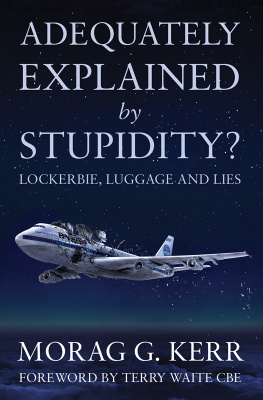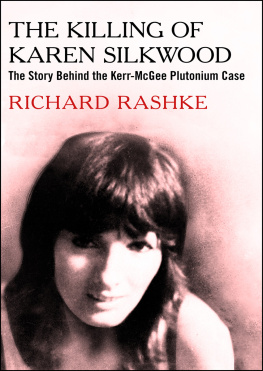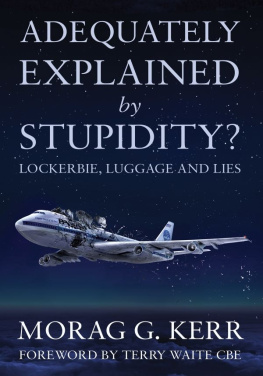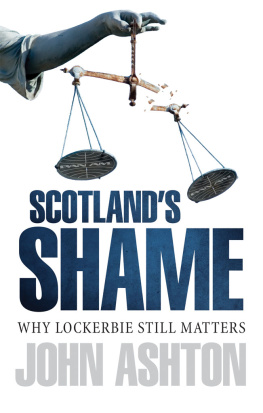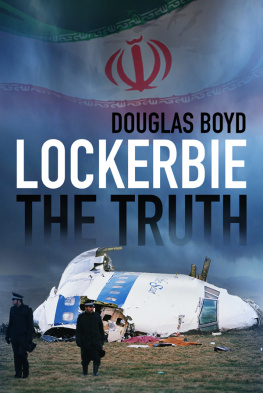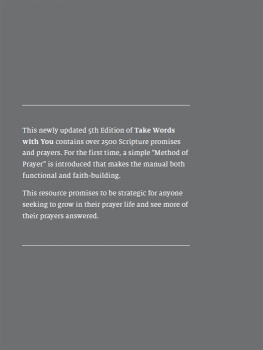Adequately Explained by Stupidity?
Lockerbie, luggage and lies
Morag G. Kerr

Copyright 2013 Morag G. Kerr
The moral right of the author has been asserted.
Cover art by Till Nowak/frameboX
www.framebox.com
Apart from any fair dealing for the purposes of research or private study, or criticism or review, as permitted under the Copyright, Designs and Patents Act 1988, this publication may only be reproduced, stored or transmitted, in any form or by any means, with the prior permission in writing of the publishers, or in the case of reprographic reproduction in accordance with the terms of licences issued by the Copyright Licensing Agency. Enquiries concerning reproduction outside those terms should be sent to the publishers.
Matador
9 Priory Business Park
Kibworth Beauchamp
Leicestershire LE8 0RX, UK
Tel: (+44) 116 279 2299
Fax: (+44) 116 279 2277
Email:
Web: www.troubador.co.uk/matador
ISBN 9781783067800
British Library Cataloguing in Publication Data.
A catalogue record for this book is available from the British Library.

Matador is an imprint of Troubador Publishing Ltd
Never attribute to malice
what can be adequately explained by stupidity
Robert J. Hanlon
FOREWORD
No one can pick up this book without remembering the family and friends of those who died so tragically on the fateful night of 21st December 1988. The explosion aboard Pan Am 103, over the small town of Lockerbie in Scotland, was an event that horrified people right across the world. Twenty-five years later those close to the victims still bear the scars of that dreadful event.
Although to a certain extent the passing of time enables some healing to take place, that process has not been helped by the multitude of speculative theories regarding the individual, or individuals, responsible for the act. Twenty-five years on, speculation continues. It is well known that the Crown prosecuted a case which resulted in the conviction and sentence of a Libyan subject, Mr. Abdelbaset al-Megrahi. There were many who felt profoundly uncomfortable about the safety of the conviction, and across the years they have raised their concerns in books and articles. Dr. Morag Kerr was one such individual, and in her quest to understand the anomalies and contradictions in the official narrative she sought out primary evidence which has not, until now, been publicly available. The result is this book which is a masterpiece of forensic investigation.
The book is highly detailed and examines with faultless logic the essential elements of the case. Dr. Kerr sticks clearly to the facts and leaves the reader seriously questioning the safety of the conviction. Given her analysis one is forced to ask how could the explosive device have been planted in the luggage other than at Heathrow? In addition to a detailed and devastating scrutiny of the provenance of the bomb suitcase, she also explores the uncertainty surrounding the allegation that Mr. al-Megrahi was the individual who bought the clothing packed in the suitcase with the bomb, some of which was later recovered in a fingertip search following the explosion. She raises vital questions about the competence of both the police and the expert witnesses. In short, any reasonable person following her analysis will be left in little doubt that there are far too many uncertainties surrounding this case for the conviction of Mr. al-Megrahi to be considered safe.
Dr. Kerr wisely steers clear of making allegations other than what can be demonstrated by the application of rigorous logic. It is in the interest of all who value justice and fair dealing, and especially those affected by the disaster, to read this book carefully and, if convinced by its argument, to press for a thorough review of this whole sorry affair.
Terry Waite CBE, August 2013.
INTRODUCTION
Sometimes what they dont tell you is more revealing than what they do. The Lockerbie trial at Camp Zeist was one of those times.
Do you want to know exactly which heading Maid of the Seas was on as she left Heathrow airport on the evening of 21st December 1988, which FM frequencies the various air traffic controllers used to talk to the cockpit, and what banal greetings were exchanged between the ground staff and the doomed flight? Its all there. Does it have any bearing on who planted the bomb? None at all.
Do you want to know what a member of the public who was driving north on the A69, or another member of the public who was waiting for his daughter at the railway station in Lockerbie, heard and saw when the plane came down? Their testimony is there. Does it have any bearing on who planted the bomb? None at all.
Do you want to know the names of all the passengers on KM180 from Malta to Frankfurt that morning, where they were going and why, and exactly what luggage they were carrying with them? Thats all there too, mostly in their own words in the witness box. Does that help us decide who planted the bomb? Maybe, but over twenty separate witnesses called to testify to essentially the same thing is gross overkill, and its anybodys guess what the prosecution thought had been proved by the exercise.
Do you want to know exactly how the twenty-four legitimate items of transfer luggage on the computer printout from the Frankfurt baggage system were reconciled to their owners, so that the twenty-fifth item could confidently be shown to be the bomb suitcase flying in from Malta? Good luck with that. Is that important in determining who planted the bomb? Extremely.
Do you want to know the names of the passengers who joined Pan Am 103 from other incoming flights at Heathrow that afternoon, which of them were discovered to have had their luggage loaded into baggage container AVE4041 in the interline shed before quarter past four, how many items there were and what these looked like? Not a chance. Is that important in determining who planted the bomb? It is absolutely vital.
Do you want to know what the baggage handler who took that container out to the tarmac said he did with these items when he was adding the transfer luggage from the delayed feeder flight from Frankfurt? Too bad. Is that important in determining who planted the bomb? It is the most important thing there is.
Of course some evidence is required to set the scene and establish the facts of what happened, even uncontentious facts. The striking thing about Camp Zeist, though, is the abundance of minute, obsessive detail presented in areas where in the final analysis it frankly doesnt matter a damn, contrasted with the fog of uncertainty that descends as soon as the evidence gets anywhere close to the crux of the matter where exactly did that brown Samsonite hardshell that blew up in a corner of AVE4041 at three minutes past seven begin its journey?
An important thing to remember about this trial is that virtually all the evidence introduced in court was led by the prosecution. The defence were entirely reactive. They called only three witnesses, who between them occupied the witness box for less than a day on days seventy-six and seventy-seven of the trial, with the Crown summing-up beginning on day seventy-eight. Only one of these three witnesses testified in relation to baggage transfers, and his testimony was in fact of peripheral relevance. As a result, the Crown had almost total control over what was presented to the court and what was not.
What they didnt tell the judges was far more important than what they did.
1

